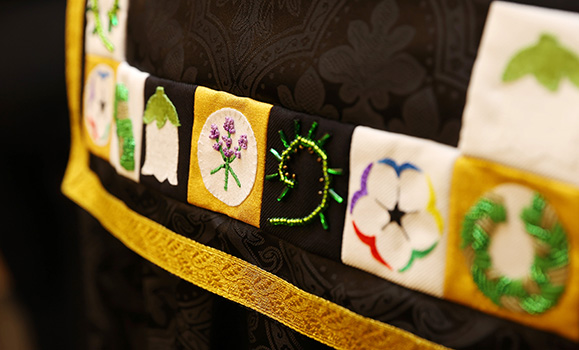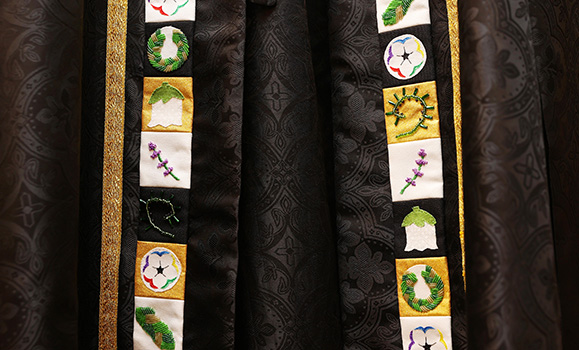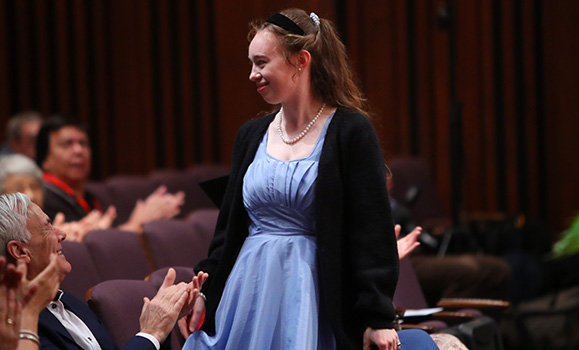Convocation ceremonies are steeped in tradition, much of it stretching back centuries. When it comes to what the president wears for the occasion, though, there’s a surprising amount of freedom to modernize.
While gowns and hoods are expected at Dal ceremonies, presidents get to choose their own decorative design elements to be laid over the standard robe.
"I was looking through Dal archives at past presidents and there was so much variety between each one," says Julia Sommerville, a Costume Studies student who created a new Dal presidential robe design this year as part of her honour's project.
Sommerville��was recommended to Dal President Kim Brooks for the project��by one of her instructors. The president was seeking an updated design to better reflect the land where ���ϳԹ���is situated, the values of the institution she leads, and her own identity.
The ceremonial garment created by Sommerville over the course of the past nine months and introduced as part of spring ceremonies at Dal this month does just that.
"I am honoured to wear the robe today, and I thank Julia for her extraordinary care and concern in its design and production," said President Brooks in opening remarks during the Faculty of Arts and Social Sciences ceremony Tuesday afternoon (May 28). Sommerville attended as a guest. She graduates next spring.

A close-up of the new robe's design details.
Behind the symbols
Sommerville kicked off her design process last fall when she met with President Brooks to learn a bit more about her vision for the new gown. From there, she dove into research and began consultations with several key Dal community members, including Elder in Residence Ann LaBillois, Assistant Vice-Provost Equity and Inclusion Dr. Barb Hamilton-Hinch, and other members of Dal’s Indigenous and African Nova Scotian communities.
These discussions helped guide Sommerville, leading her to uncover meaningful symbols for consideration. What began to emerge was a theme centred around flora and fauna found throughout Nova Scotia and Mi’k’maki.
Sommerville started gathering photos and artistic illustrations and experimenting with different motifs before eventually whittling the collection symbols down to five plants. She omitted symbols that were too recognizable or complex for the design.
“A lot of the style came from the natural plants and then trying to find the simplest version,” she explains. “If it got too complicated, you wouldn’t be able to see the details from a distance.”
Each of the plants showcased in the final design hold special meaning to the different communities represented.
 Fiddleheads:��In Indigenous communities, this member of the fern family represents how each person blossoms and unfurls as they grow — much like the plant itself. They are also eaten during celebrations.
Fiddleheads:��In Indigenous communities, this member of the fern family represents how each person blossoms and unfurls as they grow — much like the plant itself. They are also eaten during celebrations.
��
 Sweetgrass braids:��Sweetgrass is part of the medicine wheel, which is an important symbol relating to Mi’kmaw spirituality. Sweetgrass is primarily braided and used for smudging, and burning it produces smoke that acts to purify and cleanse during ceremonies and in personal use.��
Sweetgrass braids:��Sweetgrass is part of the medicine wheel, which is an important symbol relating to Mi’kmaw spirituality. Sweetgrass is primarily braided and used for smudging, and burning it produces smoke that acts to purify and cleanse during ceremonies and in personal use.��
 Blueberry flowers:��Blueberries have been an important source of food and income for African Nova Scotian communities throughout history and are still valued today in cooking and as a link to the past. The flower, rather than the fruit itself, was chosen for the robe design as it fits better with the design's theme.
Blueberry flowers:��Blueberries have been an important source of food and income for African Nova Scotian communities throughout history and are still valued today in cooking and as a link to the past. The flower, rather than the fruit itself, was chosen for the robe design as it fits better with the design's theme.
 African Nova Scotian Affairs Mayflower logo:��The mayflower is the official flower of Nova Scotia. In this logo, the mayflower's petals are a ring of seagulls and represent freedom and the carrying of the souls of ancestors. The black star at the centre serves as a symbol of emancipation, unity, hope, and honour, with the colour representing the people and the points of the stars showing the advancement of the community.
African Nova Scotian Affairs Mayflower logo:��The mayflower is the official flower of Nova Scotia. In this logo, the mayflower's petals are a ring of seagulls and represent freedom and the carrying of the souls of ancestors. The black star at the centre serves as a symbol of emancipation, unity, hope, and honour, with the colour representing the people and the points of the stars showing the advancement of the community.
 Lavender:��Lavender was chosen to represent President Brooks’s connection to the queer community, to which the flower is often linked due to the Lavender Scare — a movement in the mid-20th century that sought to search out queer people in workplaces across the United States and minimize their perceived influence. The symbol was later reclaimed by the queer community and, in this instance, also reflects that President Brooks is Dalhousie’s first female and openly queer president.
Lavender:��Lavender was chosen to represent President Brooks’s connection to the queer community, to which the flower is often linked due to the Lavender Scare — a movement in the mid-20th century that sought to search out queer people in workplaces across the United States and minimize their perceived influence. The symbol was later reclaimed by the queer community and, in this instance, also reflects that President Brooks is Dalhousie’s first female and openly queer president.
Sommerville also incorporated different colours and patterns into the design to represent the university and to provide contrast and visual harmony.
“Most of the older robes had a solid gold stripe and some of them had blue as well. The alternating coloured squares was a choice that I made to create frames for each symbol to shine within,” she explains.
Bringing the robe to life
Viewing the new ceremonial gown for the first time left Anneke Henderson, head of wardrobe in Dal's Fountain School of Performing Arts, feeling emotional.
"The final result is stunning, and it almost made me cry because everything is in such perfect balance," says Henderson, who is also a Costume Studies instructor and the one who recommended Sommerville for the project.
“The care, attention to detail, thought and research behind the designs combined with meticulous handwork are perfectly integrated into the robe in the most subtle way. That takes a special skill,” she says.
Such handwork also takes time — quite a lot of it. Sommerville spent 77 hours over the course of three weeks bringing the design to life.

Sommerville ensured symmetry for the lavender patches on the front to signify President Brooks's own identify.
“I really enjoyed it since I used a variety of textile art styles,” says Somerville. These included beading and embroidery applique, neither of which she’d worked with much before. “I tended to jump around between each of the different types of squares instead of doing thirteen squares in a row that are the same.”
That’s all following final exams and a busy end of term filled with projects, including creations for the Fountain School’s historical dress showcase and year-end production, Euripidaristophanize.

Julia Sommerville applauded during the Faculty of Arts and Social Sciences Convocation ceremony on May 28.��
Sommerville says it was all worth it to be able to contribute in a small way to Dal’s history.
“It was definitely very different than any other project I’d worked on,” she says. “I liked the idea of trying something different and the impact it could have and the significance of it.”
Sommerville returns to Dal next year to finish up a few credits she needs to complete her degree, after which she hopes to find a job in theatre making and then designing costumes.
The day Somerville stopped by the President’s Office to drop the final product off, Dr. Brooks was scheduled to be in meetings all day. When the president unexpectedly emerged from her office, Somerville was holding the robe up to show others who were there.
“She was very excited,” she recalls. “She’s been ecstatic throughout the whole process.”

